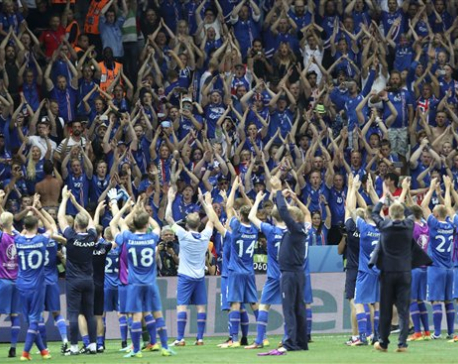
OR
Six months pregnant regularly beaten by husband
Published On: April 2, 2018 06:15 AM NPT By: Binod Subedi
BIRATNAGAR, April 2: Sabiya Khatun, a six-month pregnant woman of Biratnagar-15 is brutally beaten by her husband almost every day. Her husband Mahaboob Ansari hardly spares her. Unable to bear the daily torture and abuse, Sabiya made her mind to leave her home.
By mustering some strength, she reached out to Ward Office based in Biratnagar-6 on Saturday to complain against her husband. After silently suffering for years, she knocked on the doors of the local unit seeking justice. "I have a six months baby growing inside my womb but he would not spare us,” she said.
Since leaving her home, for the past three days she has been living in her paternal home. She shared that she has blue-black marks and wounds all over her body. Showing wounds on her leg, she asked, "how long will I bear all this?"
There were days when her husband and his family would deprive her of meal despite being aware about her pregnancy. "They all used to eat without giving me anything to eat," she said, adding, "After having their meals they use to padlock the kitchen and I had to sleep with empty stomach."
Since the last two months, she has not been able to perform any kinds of household work due to pain in her chest but still her in-laws have been forcing her to work. "They started torturing me. The torture increased even more after I became weak due to my illness," Sabiya said.
Sabiya who is from Biratnagar-6 tied nuptial knot wit Mahaboob just 11 months ago. Her mother Nigar Sultan informed that Sabiya was taken to Koshi Zonal Hospital for treatment to treat her wounds and injuries. Nigar shared concerns about the miserable condition of her daughter. She said that she had tried to discuss the matter with Sabiya's in-laws and husband but had failed in 'fixing' her daughters relationship.
However, Mahaboob denies the allegations. "She has been forcing me to part ways with my old parents but I can't do so," he said. He even claimed that he has taken her to hospital for the treatment of her chest.
Raji Ahmed, ward member of Biratnagar-6 informed that Sabiya is not the only woman who has been dealing with domestic violence. There are many cases, where husbands brutally beat their wives. Though, during counseling, husbands pledge that they won't continue the violence, they do it, he said. "Incidents of domestic violence are increasing day by day though we are making efforts to control them,” Ahmed said while assuring that Sabiya will be given justice.
You May Like This

Woman unconscious for five days after being beaten by husband
BARDIYA, May 27: A woman has been lying unconscious at a hospital in Kohalpur since five days after being beaten black... Read More...

Petrol dearer by Rs 2 per liter; diesel and kerosene by Rs 3
KATHMANDU, May 2: Nepal Oil Corporation (NOC), the state oil monopoly, has hiked the price of petrol, diesel and kerosene... Read More...

England out of Euro 2016, beaten by Iceland
NICE, France, June 28: Iceland, whose population of 330,000 makes it the smallest nation ever to compete at the tournament,... Read More...










Just In
- Heavy rainfall likely in Bagmati and Sudurpaschim provinces
- Bangladesh protest leaders taken from hospital by police
- Challenges Confronting the New Coalition
- NRB introduces cautiously flexible measures to address ongoing slowdown in various economic sectors
- Forced Covid-19 cremations: is it too late for redemption?
- NRB to provide collateral-free loans to foreign employment seekers
- NEB to publish Grade 12 results next week
- Body handover begins; Relatives remain dissatisfied with insurance, compensation amount







Leave A Comment